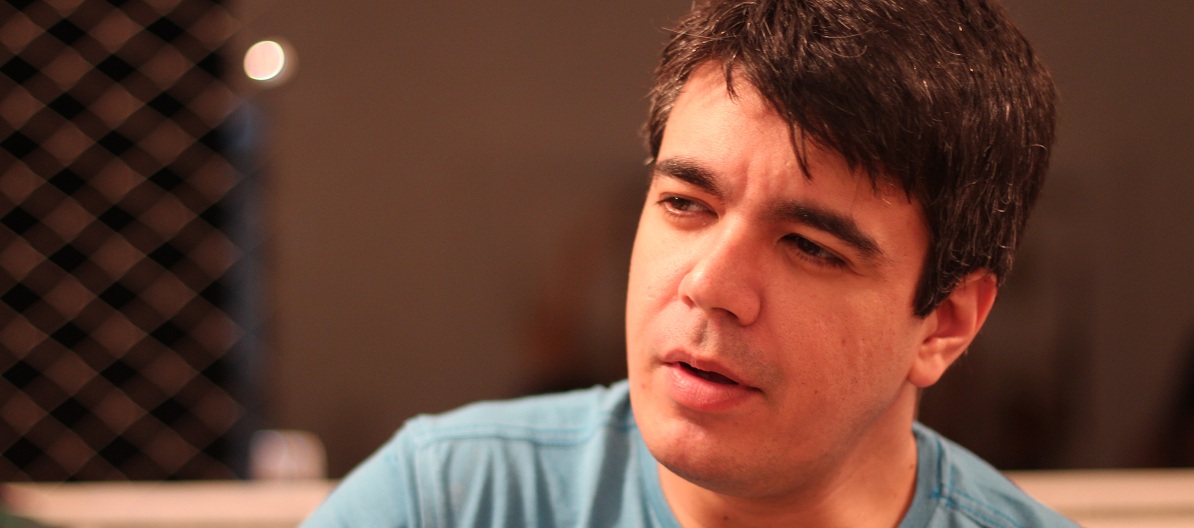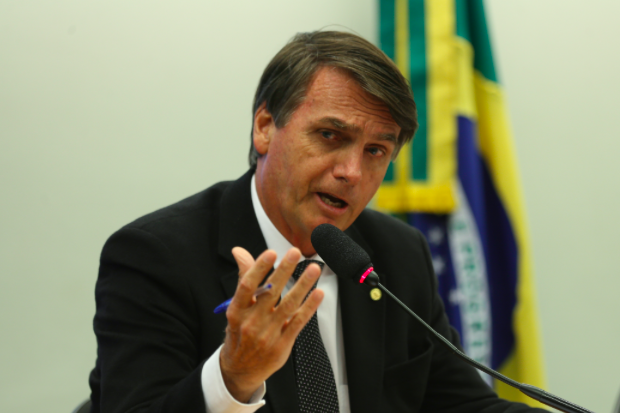João Carlos Grabois was still in his mother’s womb when he was tortured with electroshocks.
A little more than one month from his due date, he was a victim of Colonel Brilhante Ustra, probably the cruelest torturer of the military dictatorship that ruled Brazil for 21 years, from 1964 to 1985. That was a tough competition considering the many, many monsters who worked for the regime (including the notorious Sérgio Fleury).
Ustra, however, was a special kind of monster – one that found in his role during the dictatorship the opportunity to prey upon all the political prisoners that had the misfortune of falling into his hands. In at least a few occasions, for instance, he took the young children of people he was torturing to see their parents while they were in the process of being massacred.
On another occasion, Ustra sent soldiers to pick up the infant child of another couple he was “interrogating,” and to make them talk, he ordered his subordinates to torture the child.
For fifteen hours.
Yes, he tortured a baby.
It just so happens that Colonel Brilhante Ustra is the idol of former Captain Jair Messias Bolsonaro, the extreme right-winger who seems likely to become the next Brazilian president.
Bolsonaro even honored Ustra when he was voting for the absurd impeachment of Dilma Rousseff, dedicating his vote “to the memory of Brilhante Ustra, Dilma’s horror”.
Dilma was tortured by the Colonel when she was a young political prisoner during the dictatorship.
Things get uglier, however: Bolsonaro also says he believes in torture and that the only mistake of the military was torturing instead of killing the people who fought against the regime. He also said that he was not going to rape a fellow congresswoman because “she didn’t deserve it.” He compared the quilombolas (members of black rural communities formed by former slaves) to animals. He said none of his sons would date a black woman because they were “well raised.” He stated that repeated beatings could “correct” children and stop them from “turning gay”. This week, he said that, if he becomes president, he will not allow blacks, women and homosexuals to “play victims” anymore, which adds to his recent declaration that he would stop “all kinds of activism” in his presidency.
It’s no wonder, then, that his followers started putting his words into action even before the end of the election.
You see, in Brazil, we have (too) many political parties – and a candidate can only be elected if he or she gets more than 50% of the votes, something that usually demands a second round between the two winners of the first one. So, when Bolsonaro ended the first round with a little more than 46% of the votes, many of his fans took to the streets in celebration.
And that’s when the terror started.
The same night of that first round, a 63-years-old black master of capoeira, Moa do Katendê, was stabbed to death after saying to a Bolsonaro voter that he voted for Fernando Haddad, the left-wing candidate from the Worker’s Party who also got to the second round.
And that was only the beginning: since then, dozens and dozens of acts of violence were committed against Haddad’s supporters, the victims frequently belonging to one of the groups mentioned before: blacks, women and members of the LGBTQ community. (There’s a “map of political violence” listing many of these incidents – which already includes three murders – here).
How can someone like Bolsonaro be so close to becoming Brazil’s president?
Well, in order to understand that, we have to go back a few decades – and I’ll promise I’ll be brief.

Brazil was going places in the late 1950s and early ’60s. After tumultuous times that included the suicide of president Getúlio Vargas, we had a progressive president in Juscelino Kubitscheck. Later, after Jânio Quadros resigned after only seven months as his elected successor (that’s a story for another day), Brazil had an authentic left-wing president for the first time: João Goulart (Jango), pictured above.
Jango started his “basic reforms” – a program that would change education, wealth distribution, the redistribution of abandoned land, the creation of lines of credit to producers, and the nationalization of strategic resources (energy, water, oil and so on). That didn’t sit well with the right-wing-dominated military and with an economic elite that’d been benefiting from the state since the end of slavery in Brazil, and well before that.
So a coup d’etat took place. The military deposed and exiled Jango, ended all political parties, and nominated a general as our president. That happened in 1964. Four years later, in 1968, the military approved what would be known as “Institutional Act Number 5” (AI-5), which gave the military unlimited powers to repress the growing movements against the dictatorship. People started “disappearing.” Hundreds were arrested, tortured, killed. I have close relatives who were tortured in the so-called “basements” of the Political Police.
The military remained in power for 21 years. In 1985, we finally got a civilian as president again. However, he was not elected by the people, but by the Congress, which was back in action. Nothing is easy in Brazil, though, and that president, Tancredo Neves, got sick and died before he could take office. His vice-president, José Sarney, became the president and… well, he was not a good one, driving inflation to a new peak.
Our next president – the first one elected by the people since João Goulart – lasted less than three years before an impeachment procedure that resulted in his resignation for corruption charges. Then came a period of calm: we had Fernando Henrique Cardoso for two terms (eight years) and then Luis Inácio Lula da Silva, aka “Lula,” for another two. Cardoso helped implement a new currency and control inflation. Lula implemented reforms that took 42 million people out of the poverty line, and turned Brazil into an international leader in fighting hunger and inequality.
After eight years, Lula left office as the most popular president ever, with an almost 90% approval rating. He was succeeded by Dilma Rousseff (pictured below), an ex-revolutionary who fought the dictatorship and was tortured by the military. Four years later, Dilma got reelected.

And then, the same forces that helped take Jango down decided they’d had enough of leftist presidents. With the help of the media—all major Brazilian networks are Fox News, basically—some members of the judiciary, and the right-wing parties, they cooked up absurd accusations against Dilma involving BUDGETARY MANEUVERS (not corruption, I want to stress) and impeached her. Oh, an important detail: her vice-president helped them do it. (In Brazil, it’s frequent that the President and the Vice-President are from different parties; and her successor became part of the “white coup d’etat” to remove her.)
The country got really polarized between Left and Right, and that’s when our worst historical mistake came back collecting its dues. You see, when the Dictatorship ended in Brazil, we didn’t do what Chile and Argentina did when their dictatorships ended: we didn’t held any military accountable. Everyone was pardoned.
Not one torturer went to trial.
Not one executioner.
So now we have generations of people who simply don’t believe we even had a dictatorship.
Or that it was a hardline one.
They believe that everyone who got killed or tortured “deserved it.”
That the youth wanted to establish a “Communist Dictatorship.”
And that the military “saved” us.
That’s the context that made Jair Bolsonaro possible.
And that’s why he acts like he was in the ’50s and managed to convince people that “COMMUNISTS ARE A THREAT!”
Yes, in 2018 that’s still a thing in Brazil.
But then something happened: Lula became the favorite to win the presidency in the next election. More than that: he was expected to win in the first round. So, to stop that, he was accused of corruption by Sergio Moro, a right-wing partisan judge, and incarcerated. The whole process is full of irregularities and it has been denounced by international groups as a way to keep Lula from running. Which they managed to do even though the UN human rights committee ruled he should be allowed to run. (Noam Chomsky visited Lula in his cell recently and wrote about it.)
And that’s when Bolsonaro started posing as the country’s savior, vowing to “end corruption and violence” by any means necessary – conveniently forgetting the stains on his own resume. He was named in a bribe list known as “Furnas List.” He was proven to have a “ghost worker” in his payroll (which is funded by federal money). He used federally approved funds to pay for his rent even though he had an apartment of his own. His son, who is also a congressman, had an astounding growth of 432% in his net worth in a span of few years. His current presidential campaign was recently exposed as receiving non-disclosed corporate donations to send fake news to millions of voters through WhatsApp (corporate donations are forbidden by Brazilian electoral law).
Still, Bolsonaro poses as the solution for corruption. And many Brazilians bought the farce.
What’s worse is that to many of his fans, his misogyny, his racism, his homophobia, and his xenophobia are seen not as negative qualities, but virtues.
And here we are: the second round will happen next Sunday, but one of Bolsonaro’s son (another congressman; yes, politics are a family business for them) already threatened to send the army to shut down the Supreme Court in case it tried to contest his father’s candidacy based on the aforementioned irregularities.
As that was not enough, Bolsonaro himself said, during a speech a couple days ago, that he will oversee a “cleansing of the reds” (meaning left-wingers), who will have to “either get out of the country or rot in jail”.
In case you didn’t notice it, I’m one of those “reds” – and a vocal one, at that. What’s more shocking is that Bolsonaro’s fans, seemingly still living in the 1950s, are always saying they’ll “finish all communists” in Brazil.
Sen. Joseph McCarthy would have loved them.
I haven’t given up, though. The election is couple of days always and maybe, just maybe, Brazil will come to its senses before it’s too late. I can’t believe my country will basically tell its children (I have two of my own) that hatred is something to be rewarded.
It may be a cliché, but I keep thinking of John Lennon’s verses:
“You may say I’m a dreamer/But I’m not the only one./I hope someday you’ll join us And the world will be as one.”
The pessimist in me reminds me that Lennon was shot to death. The realist, that his words remain alive. The optimist, that maybe they still hold some power.
I can’t stop hoping.
And so I hope. For my children, my country, and our humanity.












